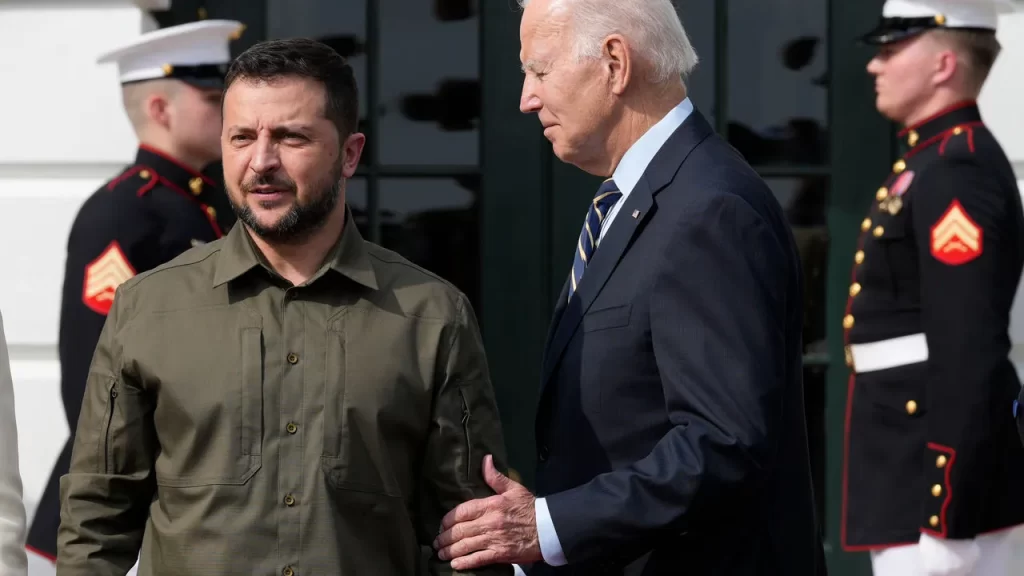Missile news welcomed in Ukraine but ‘won’t win war’
3 min read
Image: AP

Image: AP
In Ukraine, the recent approval from the United States for Ukraine to use long-range missiles has been met with cautious optimism. President Volodymyr Zelensky, who has been advocating for this moment for months, downplayed the significance in his nightly address. “Strikes are not made with words,” he said, adding, “Such things are not announced, missiles speak for themselves.”
The permission allows Ukraine to deploy the Army Tactical Missile System (ATACMS), a weapon capable of hitting targets deep inside Russian territory. This move, though a significant milestone, is expected to be used primarily to defend a small section of Russian-held land in Ukraine’s Kursk region, where Ukrainian forces are holding out amid an anticipated major Russian counteroffensive. The offensive is expected to be bolstered by up to 10,000 troops from North Korea, further complicating the situation for Ukraine.
While the use of ATACMS could shift some dynamics on the battlefield, Ukrainian military experts are careful to temper expectations. While the missiles could challenge Russia’s efforts and help Ukraine retain leverage ahead of potential peace talks next year, they believe the decision will not drastically alter the course of the war.
Maj. Volodymyr Omelyan, a Ukrainian officer, acknowledged that while the news had energized the country, it wouldn’t immediately change the strategic situation. “Ukrainians are very much inspired,” he said, but also emphasized that the missiles won’t turn the tide of the war on their own. Omelyan dismissed Russian threats that the U.S. decision would escalate the conflict, calling them mere “bluffing.” He pointed out that Russia had previously made similar warnings about other Western weapons Ukraine has received, yet no significant consequences followed.
The news, however, has sparked mixed feelings in Ukraine. While many are pleased with the new military capability, some politicians have expressed frustration with the delays in U.S. action. Inna Sovsun, a Ukrainian Member of Parliament, voiced her approval of the decision but lamented that it took too long to arrive. “It could have saved lives if it had come sooner,” she said. Sovsun pointed specifically to the destruction of Ukraine’s energy infrastructure, much of which had been damaged or destroyed by Russian strikes before the missile decision was made.
Ukraine’s officials are still unclear on how many ATACMS will be supplied or the full extent of how they can be used. The U.S. has not disclosed specific details, including the quantity of missiles Ukraine will receive or any restrictions on their use. Ukrainian MP Oleksiy Goncharenko stressed that it is not enough for the U.S. to grant permission — the country needs a significant supply of missiles to make a tangible difference. “It’s very important to have not just permission, but missiles — to be capable of making a difference,” he said. He also expressed regret that it took so long for the decision to be made, noting that it had been almost three years since the war began. “Better late than never,” he added, though the delay is felt keenly by many in Ukraine.
The long-awaited U.S. decision is certainly significant, but there are still uncertainties surrounding its impact. Ukrainian MP Maria Ionova underscored that while the missiles are a valuable asset, they are “not the silver bullet” that will resolve the conflict. She called for a broader strategic shift, emphasizing the need for Ukraine to remain united, especially as Russia continues to press its own advantage. “Our enemies are united — and we should stand together as well,” she said, underlining the importance of cohesion in the face of a persistent and well-resourced adversary.
Meanwhile, as winter approaches and the war drags on, Ukraine is reminded of the ongoing cost of the conflict. Russian missile and drone attacks over the weekend killed at least 20 people, reinforcing Moscow’s determination to continue the war on its terms. These attacks serve as a stark reminder that Russia remains committed to its goals, regardless of external assistance or setbacks.
In conclusion, while the U.S. missile decision marks a significant step for Ukraine, it is far from a game-changer. Many in Ukraine are hopeful, but they also recognize that this is just one piece of a much larger puzzle. The missiles may help level the playing field slightly, but the road to peace or victory remains long and fraught with challenges. As the war continues into the colder months, Ukraine’s resilience and strategic adaptability will be tested as never before.